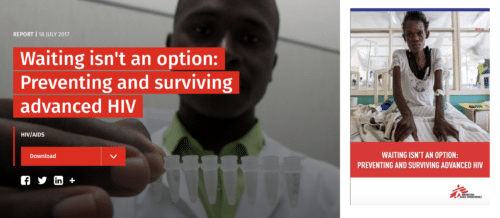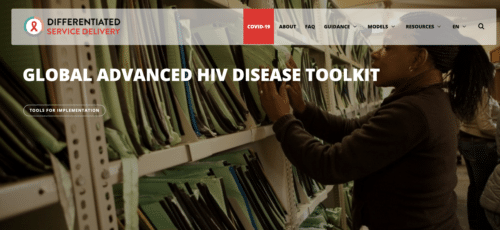A CALL TO ACTION
Differentiated Care for Adults at High Risk of HIV Disease Progression
The CQUIN Project for Differentiated Service Delivery
The development of differentiated models for people with advanced or unstable HIV disease will be a priority as DSD expands and matures. This document defines the target populations of interest, describes the currently recommended packages of care, and reviews existing DSD models. It will serve as a call to action to motivate stakeholders to share their experiences, generate new evidence, and to advocate for attention to this high-risk population. Read more ...
ARTICLES
Addressing Advanced HIV Disease and Mortality in global HIV programming
Andrew T. Boyd et. al
AHD upon diagnosis or re-engagement in HIV care is not uncommon, and it substantially increases risk of death from OIs. Read more…
Concurrent Advanced HIV Disease and Viral
Load Suppression in a High-burden Setting:
Findings From the 2015–6 ZIMPHIA Survey
S. Balachandra et. al
As Zimbabwe approaches epidemic control of HIV, programs now prioritize viral load over CD4 monitoring, making it difficult to identify persons living with HIV (PLHIV) suffering from advanced disease (AD). Read more…
Package of Care for Children and Adolescent With Advanced HIV Disease: Stop AIDS
World Health Organization
The major causes of morbidity and mortality among children living with HIV in low- and middle-income countries are pneumonia (including Pneumocystis pneumonia), tuberculosis (TB), bloodstream infections, diarrhoeal disease, and severe acute malnutrition. Read more…
Proportions of CD4 Test Results Indicating
Advanced HIV Disease Remain Consistently
High at Primary Health Care Facilities Across
Four High HIV Burden Countries
Katherine Lamp et. al
Globally, nearly 22 million HIV-infected patients are currently accessing antiretroviral treatment; however, almost one million people living with HIV died of AIDS-related illnesses in 2018. Read more…
Managing Advanced HIV Disease in a Public Health
Approach
Nathan Ford et. al
In 2017, the World Health Organization (WHO) published guidelines for the management of advanced human immunodeficiency virus (HIV) disease within a public health approach. Read more…



